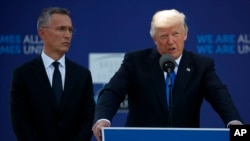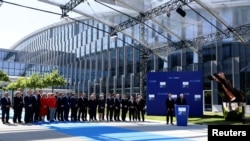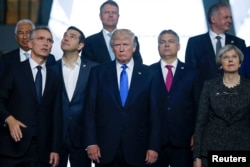NATO Secretary-General Jens Stoltenberg says the message in U.S. President Donald Trump's "blunt" speech urging alliance members to boost defense spending echoed that of previous administrations.
Stoltenberg spoke to RFE/RL in an interview on Friday, a day after Trump met with the other leaders of the 28-member military alliance at its new headquarters in Brussels.
Trump used a large part of his speech before unveiling a 9/11 memorial to admonish allies he said are not shouldering their share of the financial burden.
It is "not fair to the people and taxpayers of the United States" that only five NATO countries currently meet a target of spending at least 2 percent of gross domestic product on defense, he said.
WATCH: NATO Chief not shocked by Trump’s 'blunt and direct' speech
Trump "has a blunt and direct style," Stoltenberg told RFE/RL. "This plain speaking is something we have seen before and he expressed clearly an expectation that European allies and Canada should invest more in defense.”
However, he added that "the language may be different and the words may be different but the core message is the same as we have heard before, also during the previous administration: that we need fairer burden-sharing in the alliance."
NATO countries pledged in 2014 to try to reach the 2 percent target within a decade, but so far only Britain, Estonia, Greece, Poland, and the United States are doing so.
Many NATO countries, especially on the organization's eastern edges, have expressed concerns about the perceived threats from an aggressive Russian foreign policy and about Trump’s commitment to the Western alliance and to sanctions placed on Moscow for its interference in Ukraine.
'Strong, united approach'
A U.S. official on Friday caused concern when asked whether Trump plans to extend Ukraine-related U.S. sanctions against Moscow.
"I think the president is looking at it. Right now, we don’t have a position," White House economic adviser Gary Cohn told reporters en route to a Group of Seven meeting in Sicily.
However, later Friday at the G-7 summit, Cohn came out strongly in favor of sanctions.
“We are not lowering our sanctions on Russia," he told reporters. "If anything, we would probably look to get tougher on Russia."
Stoltenberg insisted to RFE/RL that the alliance has a "strong, united approach" to Moscow.
"I know that NATO is united in our common approach to Russia, which is about credible deterrence and defense combined with political dialogue, and that is exactly what we are delivering on," he said.
The NATO chief said the alliance has "implemented the strongest reinforcement of collective defense since the end of the Cold War" but has also engaged in talks with Moscow "because Russia is our biggest neighbor."
"We have to avoid a new Cold War," he added. "We don't seek confrontation with Russia and, therefore, also our deployment of forces in the eastern part of the alliance is defensive. It’s proportionate and it is done in a way which sends a clear signal of multinational presence."
Ukraine crisis
He said NATO leaders discussed the Ukraine crisis during their Brussels gathering.
"Of course, we also addressed issues like Ukraine, where we see that Russia continues to destabilize Ukraine, continues to provide support for the separatists in Eastern Ukraine, and continues to illegally annex Crimea."
He said it was important that all NATO members express "strong political support" for the territorial integrity of Ukraine and to seek a peaceful, negotiated settlement to the crisis.
"On top of that, we also provide practical support, helping Ukraine to build more modern security institutions, implement reforms fighting corruption, developing command and control, strengthening their cybercapabilities, and many other areas, logistics," he said.
Afghan mission
However, he added that NATO is facing many other important issues.
“NATO is about addressing many different security challenges, including the terrorist threat, the instability we see to the south, [the extremist group Islamic State], Iraq, Syria, Afghanistan, and also, of course, cyberthreats where, of course, we have threats coming from many different state and non-state actors.”
Stoltenberg said the alliance is studying the need to send additional troops to Afghanistan to aid the battle against the Taliban, the Islamic State group, and other militants.
"What is clear is that NATO allies will continue to sustain our mission in Afghanistan," he said. "It’s currently at 13,000 troops," adding that alliance leaders are assessing the request from their military chiefs to increase troop levels "with a few thousand."
“That has not yet been decided. But it’s clear that will continue. The exact troop levels [will be known] in the coming weeks.”








